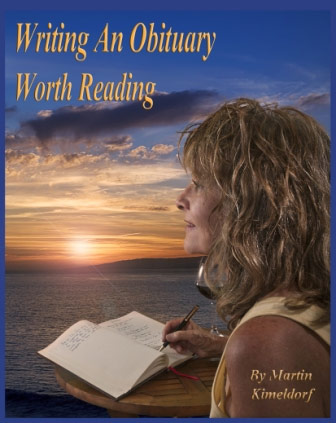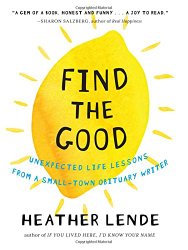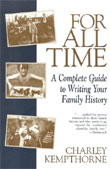Obituary Writing Tips
Here are some tips to writing an obituary that is accurate, lively, and memorable.
An obituary is many things in one: a notice of a death, a story of a life, a record of the extended family, information about a funeral service, a thank you to those who helped out, a request for memorial donations. The basic information must be covered, accurately and completely. As well, an obituary can be a compelling story of a life.
Accurate and Complete
Accuracy and completeness are most important. This sounds obvious, but it is not easy. Errors can slip in, names can be misspelled, dates can be wrong, information can be missed. The best way to ensure accuracy is to proofread, and then to proofread again. A good way to catch errors is to set aside a document, and then look at it another day - another reason to plan ahead so that you have the time to do it right. Use this website's obituary template as a basic guide, but also use your judgment as you go along. The final result is up to you, but it would be a mistake, for example, to omit some relatives simply by accident (in addition to the ones that you wanted to leave out!).
I have collected obituaries with numerous errors, of both omission and commission. Some omit the date of birth. Some even omit the date of death – which one would conclude was of obvious importance. Many do not accurately list relatives. For example, some list the grandparents who survived and predeceased the individual, but they don't add up to four, which again one might think was obvious. I have seen obituaries that have misspellings, including the name of the hometown, or even words like "interment." I was sent an obituary of an older woman by a person who knew her - it omitted the date of birth, as well as the interesting fact that she had lived to be 101!
Otherwise good ideas are compromised by these errors. One obituary of a great-grandmother, for example, referred to a park bench being placed in her memory in a "birth forest." The location of the bench is by the birth tree of her grandson "John." This is a nice idea, except that "John" is referred to earlier as her great-grandson.
A concern about “identity theft” is prompting some to recommend not providing complete information – such as the date of birth – in an obituary. Although we don’t want thieves to steal the identities of the dead, I think this would be a real shame if obituaries were to be greatly abbreviated. The complete details are important, including the date of birth, middle names, and maiden names of married women. These details are also useful for family and community archival and genealogical uses.
Being prudent is obviously in order, and everyone will have to find their own balance between completeness and caution.
Help Prevent Identity Theft
- Learn how to prevent identity theft after a death, such as notifying banks and credit bureaus of the death.
- Be careful. For example, do not print house addresses in an obituary as these can be a clue to an empty home at the time of a funeral.
- Consider preparing a shorter public obituary without
crucial
information, and a longer more complete one for family records and
future genealogical research.
Make it Lively
“Summing up a life is an awesome responsibility,” points out newspaper obituary writer Alana Baranick, on her website Death Beat. An obituary can be interesting and compelling - especially if it focuses more on the life lived than on the notice of the death. An obituary can help those in the family and other people know more about one of their own members, themselves, and the community in general.
My files contain obituaries that show how dull some are when there is but the basic list of name, date of death, and funeral arrangements. I have one of a man who lived to 96, yet his obituary only contains 69 words (including the date and time of funeral and donation requests); another who lived to 86 whose obituary is only 82 words. Surely their lives were more than that! If the cost of buying classified space was a concern, I say leave out the donation part and include something about the person who lived their life. Even three carefully chosen words can sum up a life.
I also think that most people would like to thank those around them for helping them in their opportunity to live, work, raise a family, and participate in society. Many would like to thank not only those who cared for them when they were sick, dying, and after death; but also those who helped along the way of life. The obituary is that chance to reach out with a report of a life lived and engaged in a community.
“If we're lucky,” Baranick says, “an obituary will inspire the living to be good to their neighbors, strive for success and keep hope alive.”
For many people, their obituary may be just about the only thing that is ever written about them in their whole life and death. The obituary can be the defining statement about that person for the family, friends, and community. An obituary can be read now, and saved for generations. All the more reason to make it lively and significant.
Obituary Writing Tips
- Use this website. Look at the Obituary Template, consider Delicate Questions, avoid common Pitfalls, check out other Resources. And consider Writing Your Own Obituary.
- Research your newspaper. If you are writing for your local newspaper, find out about the particular format, possibility for a free listing, and prices if you have to pay. Format, procedure, and price vary from place to place.
- Be aware of identity theft.
- Strike a balance between life and death. Make your work not only a basic notice of the death, but also a compelling story of a life lived.
- Focus on the deceased, not the obituary's authors. Do not start with "the family announces . . ." and do not refer to the deceased, for example, as "Mom" or "Dad." Describe the deceased as an individual, in the third person.
- Decide how many family members to include. This includes the number of “predeceased by.” How many generations do you want to go back? Grandparents – be careful about just naming the ones that the deceased personally knew and forgetting the others. Step-families? Uncles and Aunts? (Be careful about naming just some and not others, unless you are intentionally selecting some members of the family.)
- Show, rather than tell. Show characteristics rather than listing facts. Show that the person was charitable by actual examples, rather than just saying he was "charitable." Show with interesting stories, rather than telling with just dry facts.
- Think of three words. Find three words that sum up the life lived. These words could be at the end of the obituary and also used elsewhere, such as at the funeral or epitaph at the grave. (Or, think of six words; see the review "Six Words To Describe A Life?")
- Consider writing several versions. For example: a short one for a paid classified ad, a longer one for background to the eulogy at a service, and an even longer one for family scrapbook, history, or website. Length for newspaper, in words: could be about 150 to 500 words; a life story, memoir, or family history would be much longer. See the Resources page of this website for more ideas.
- "Complete information to follow." If you need to submit a short notice of a death and funeral information, then do so. If you plan to submit a longer one later, then actually get around to doing it.
- Revise and edit. As with any writing, revising improves the final product. This process not only spots errors, but also improves the style. An excellent way to see ways to improve any effort, is to set it aside for a few days, then look at it with fresh eyes, your own and someone else's. All the more reason to prepare something ahead of time, instead of rushing between the death and the funeral.
- Proofread. Then proofread again.
See Also:
Obituary Template
Six Words To
Describe A Life?
Memoir
Writing: Ten Tips
How to Write a Life Story
A Family History Writing Workshop
More From Obituary Guide:
- Writing Your Own Obituary Offers Chance for Reflection
- How to Write a Legacy Letter (Ethical Will)
- A Family History Writing Workshop
- Helping Families "Most Satisfying Work" for Funeral Celebrant
- Be Prepared: Will, Health Care Directive (Living Will), and More
Books You May Find of Interest:
Not Quite What I Was Planning:
Six-Word Memoirs

Writing an Obituary Worth Reading:
A Guide to Writing a Fulfilling Life Review

Find the Good:
Unexpected Life lessons From a Small-Town
Obituary Writer

Having the Last Say:
Capturing Your Legacy in One Small Story

Obit:
Inspiring Stories of Ordinary People Who Led Extraordinary Lives
For All Time:
A Complete Guide to Writing Your Family History

Thrive:
The Third Metric to Redefining Success and Creating a Life of
Well-Being, Wisdom, and Wonder

Press Ctrl + D to Bookmark this page

